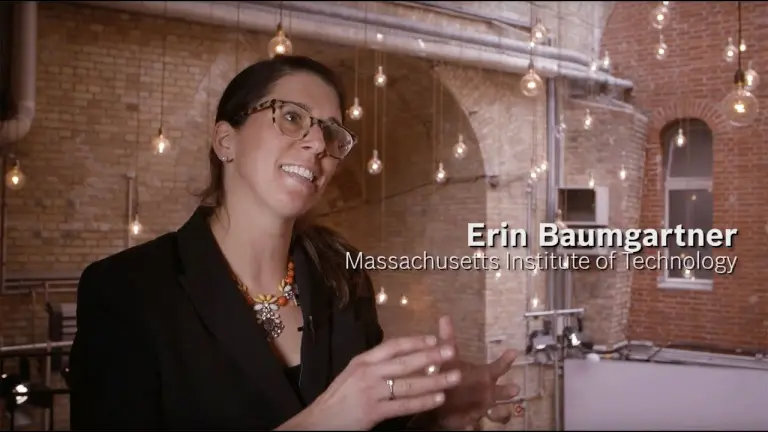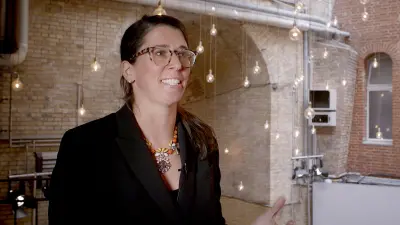“Cities have to be more pleasurable to live in“
In dialogue with the Assistant Director of the Massachusetts Institute of Technology

Cities are lively, beautiful, and old — but are they smart, too? The internet of things doesn’t just make devices and buildings intelligent, but entire living environments, too. Erin Baumgartner, Assistant Director at the Massachusetts Institute of Technology, hopes to make cities more attractive.
An interview with Erin Baumgartner, an expert on smart cities

Loading the video requires your consent. If you agree by clicking on the Play icon, the video will load and data will be transmitted to Google as well as information will be accessed and stored by Google on your device. Google may be able to link these data or information with existing data.
“People are not just data points, you have to think about the human experience within the city.”
We all leave a data trail, no matter where we are or what time it is
From mathematicians to designers: the team from Senseable City Lab at Massachusetts Institute of Technology (MIT) is made up of 40 brilliant minds with a wide array of expertise. Working with team leader Erin Baumgartner, Assistant Director at MIT, they are pursuing a clear goal: cities need to be smart, in other words connected in intelligent networks. “Our cities face complex problems, meaning that a diverse mixture of expertise is required”, explains Baumgartner. Experts have known for years that more and more people are moving to cities, traffic levels are on the up and resources are running out. However, thanks to the digital revolution, large quantities of data can now help to find solutions. In principle, the data is already there, we just need to use it properly: “People leave behind digital trails that tell a story. Here at MIT, we collect data on the environment, finances, telecommunications and traffic. We link it all together to look at the bigger picture and then we really get going.”
“The rich amount of data in sewage had literally been just flushed down the toilet.”
Sewage that knows it all?
One of the richest sources of data for Erin Baumgartner and her team? Sewage. It may be the waste from our daily lives but it also contains an incredible amount of information: “It’s all valuable data — and this is a really bad joke — but we just flush it down the toilet”, explains Baumgartner. Because sewage can reveal something about the people who create it, the Senseable City Lab has set up “Underworlds”, along with a number of other projects. Special iPhone-controlled robots collect data in the sewage system, which allows urban epidemiology to take place in real time. This means that changing health problems among the city’s population can be monitored and, at the same time, their causes can potentially be identified. For example, if germs and viruses are identified in waste water, an early warning system can help to stop waves of illness. As a result, people stay healthier and the city saves money on medical care. Here, it is particularly important to conduct research both in the lab and, in particular, in real life: “We want to study cities like petri dishes”, explains Baumgartner. “This is the only way we can find out whether the solutions we believe to be correct are actually effective, too.”
“There are a thousand things that you could focus on to create the perfect city, but I think starting with transportation is one way in.”
Most cars aren’t needed
What could make cities healthier, better places to live? One way would be to drastically reduce the number of cars. “90% of cars in cities are superfluous, as they are only used for about 5 to 10% of the day. Getting rid of these vehicles would have a positive impact on traffic, air quality and productivity.” For instance, the Senseable City Lab researched taxi traffic in New York for an entire year and analysed data for 150 million journeys. The result? If New Yorkers were willing to take a joint taxi and accept a 5-minute wait, they could share journeys in around 90% of cases. “This would prevent traffic jams, which would help to create a positive atmosphere among New Yorkers”, explained Baumgartner. Electric and semi-autonomous cars would also do cities good over the long term. Baumgartner calls Bosch a pioneer in the field of electromobility: “The work that Bosch is doing is enormously important. The company is creating a network of various products and passing them on to the customer as an overall package.”
Erin Baumgartner — Assistant Director, Massachusetts Institute of Technology

Erin Baumgartner has been running MIT’s Senseable City Lab since 2014, focussing on Urban Studies and Planning. She leads a multidisciplinary research team and develops partnerships between the lab and cities, companies or foundations that support the researchers. She completed her degree in French Literature in New York and Paris.
Summary
To remain attractive to residents, cities have to become more intelligent. Erin Baumgartner and her team at MIT are working on smart cities by collecting specific types of data. This will help to avoid traffic jams and predict waves of illness.